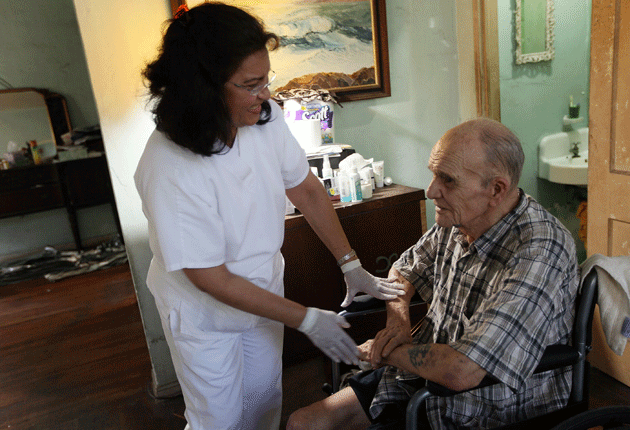
What courses? Health and social care; health care; health, community and social care; health professions; mental health care; community and public health. Specialism in mental health care is also popular.
What do you come out with? BSc or a BA in couple of cases.
Why do it? “Patient care is at the heart of health education. Caring qualities are clearly vital but so too is the ability to spot when things are going wrong; the knowledge to work out with patients what they need and the skills to provide highly specialised 21st century health care. This is why you will spend half of your time as a student providing care in diverse settings from acute hospital wards to patients’ homes. In social care too, learning to work with clients and their families is key, as is the ability to work alongside other professionals such as nurses, doctors, midwives and the police. As well as university study, you will work under the supervision of social workers in fields such as child protection and vulnerable adults to develop the essential skills required." - Professor Donna M Mead OBE, dean of faculty of health, sport and science, University of Glamorgan
What's it about? Looking after the general wellbeing of others - just because you’re not a doctor does not mean you cannot assist in ensuring that people are living a happy healthy life. A degree in this area teaches you the basics of the care industry, from learning about a service user’s journey through the system, to key aspects of law and practice. It’s a hands-on, career-focused degree, in which workplace learning is a big element, with many universities offering observational learning within health or social care environments. Health and social care involves knowledge across a range of areas, so the way you learn will vary depending on topic, but expect to work closely alongside students in related areas, including those studying programmes in social work, radiography and occupational therapy, giving you a taster of how you will be expected to work with other professionals in the ‘real world’.
Study options: Thee years full-time in nearly all cases. Sandwich years are generally not offered, as placements are taken in chunks throughout the teaching year. It’s a popular choice to take health and social care courses part-time, while notching up some hours working in the field, although to take this option you’ll have to apply to universities and colleges directly.
What will I need to do it? Anything goes really – you just have to show you’ve got the passion for looking after others that will help you thrive in the industry. Many students complete a foundation degree in a related area before taking the full honour’s degree in one ‘top-up’ year. Entry grades vary, but on the whole aren’t too high – at Glamorgan you’ll need 280 UCAS points (BBC at A-level) and at Derby it’s 260 points (BCC).
What are my job prospects? Having taken such a vocational degree, most graduates want to head into the care industries, whether that’s in the public or private sector. The demand for competent health and social care workers is always high, so graduates should not find it too hard to find work in various areas within the industry, be that promotion, community work, social and public administration or similar fields. There’s no separate employment profile for health and social care in The Times’ Good University Guide 2012, but both social work and nursing have very good statistics concerning graduate prospects. Around 66 per cent of social work graduates go straight into graduate-level positions, while those who complete a nursing qualifications, it’s nearer 95 per cent. If we use these two categories as a guide, the outlook is very positive.
Where’s best to do it? The Complete University Guide 2012 doesn’t offer a league table for health and social care, but Glamorgan, Middlesex and Kent all feature in the top ten for social work, and all offer courses in the area. Southampton, which offers a one-year top-up in health and social care, came second in the Guide for nursing. The universities of East London, Sunderland, Northampton and Winchester all have impressive portfolios of courses offered in health and social care too.
Related degrees: Nursing; social work; medicine.
Join our commenting forum
Join thought-provoking conversations, follow other Independent readers and see their replies
Comments